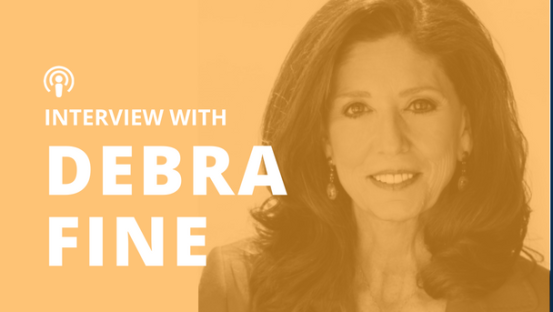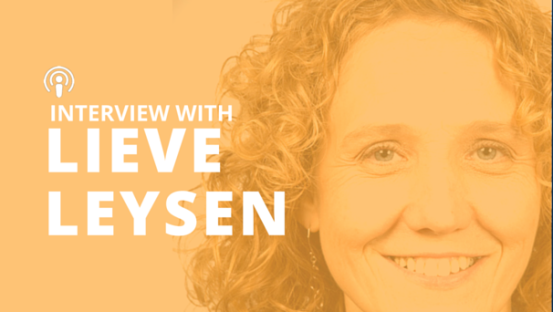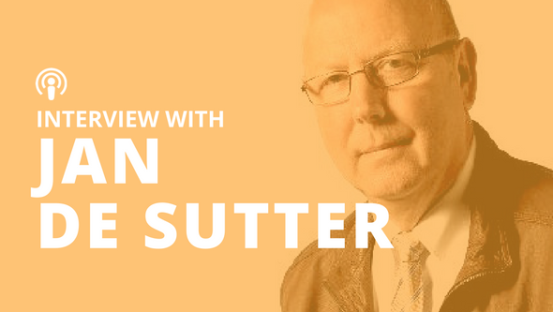Behind the Curtain: Interview with Agnes Uhereczky

"I really believe that when we listen to a passionate speaker, we turn our attention to them, and we really are taken on the journey of the talk."
In this interview, we speak with Agnes Uhereczky, the co-founder of WorkLifeHub. WorkLifeHub works with companies to build sustainable models for their teams, helping them create the right balance between their work lives and their personal lives.
She speaks to us about how the modern workforce is rapidly changing, and why it is essential for organizations around the world to create work environments that are healthy and productive.
Agnes also shares her insights as a speaker about how to engage audiences by accurately accessing their needs, and using techniques like storytelling and humor, to share key information.
Interview with Agnes Uhereczky
Q: To start us off, can you describe what it is that you do?
A: I am the co-founder of the WorkLifeHub. This is a social enterprise that Zoltan Vadkerti and I set up in 2014.
We aim to become the go-to place for anything related to work life balance, in a very broad sense.
Q: When you say 'the work life balance,' what do you mean?
A: There is a common misconception when people think about work life balance: often if I say “I'm working on work life balance,” their first reaction is: “Oh, so that means that people just want to go home earlier,” or “they want to pursue a hobby.” But when you dig deeper, it is a much broader subject.
Work life balance concerns society, it concerns the way we organise our lives, and it also concerns the economy.
We look at everything from work organisation, flexible work hours, remote work, teleworking, to the growing number of independent workers and freelancers, all the way to leadership skills, but also the policies of legislative environment (like what kind of legal measures need to be in place for maternity leaves, paternity leaves or carer's leaves.) From child care provision to elder care provisions. We have really set ourselves a big task!
Q: What are your overarching goals? What are you hoping to achieve with WorkLifeHub?
A: We are really passionate about our belief that there can be, and it is possible to have, a healthier, greener and a happier way of life.
We believe that currently we are not fully harnessing the potentials of technology, of knowledge, of connectedness; enough to give people a really good quality of life. There are just a lot of people who are stuck in bad quality jobs. A lot of people, especially women, who do not have access to the labour market because they have care responsibilities.
We are really about a culture change and the shift in mind-sets to make sure that everybody can have access immediately to a better way of life, and a better way of working.

Q: How did you get started with WorkLife Hub? What inspired you to start this business?
A: The inspiration goes back to 2012, when we were both working for a European umbrella organisation, and we launched a campaign to have 2014 the European Year of Reconciling Work and Family Life.
We organised conferences around the topic and we really started digging ourselves into the issue, making connections globally. After a while, we just thought, “Okay, how could we really translate our knowledge into impact?”
What struck us most is that there's still very little awareness at the workplace about leadership, about work organisation, about internet policies at the workplace to advance on this issue. This is what really motivated us.
Q: How do you help organisations create this balance for their employees?
A: We have created a three step approach. We start with a diagnostic: where we produce a kind of a heat map for the leadership of the organisation about employee happiness, engagement, about perception from the employees of their own work life balance. In this stage, we also look at how they harness talent, and how effective the organisation is in terms of work organisation.
Once we've done this, then we go deeper, and study the details of the organisations. Then we help organisations write their internal policies, and then really help them implement some of these strategies that we come up with together, to anchor this into the culture of the organisations.
We really believe that doing good business, or being a great place to work, has to be anchored in the DNA of any organisation. This can be a university, hospital, or a public authority. It can be a small company, a start-up, a large company; they really need to anchor these values into the culture and then iterate with policies and with management practices.
It is like a muscle, your work life balance muscle. The more they exercise, the better organizations become at it.

Q: What will be the effect for the company once they've created this balance and they've created these policies?
A: One of the biggest challenges for the companies, especially in Europe and North America (and perhaps increasingly in Asia) is to attract and to retain a talented, qualified workforce.
Talent that is going to stay with the organization. Last year, we spoke with Professor Castles, and he said, “Employees have two legs. They have one that they can walk into the organisation and one they can walk out.” It costs a lot of money for organisations to continuously recruit the best.
Once companies manage to create a really attractive, vibrant culture that fosters diversity by helping working parents and carers, then they will have no problem attracting and retaining loads of talented employees. They will immediately reduce costs on recruitment and training.
Also, a happy workforce is a much more productive workforce, and it's a healthier workforce.

Another cost, or pay point, for organisations is their absenteeism and burnout rate. If you have a colleague who's on sick leave on and off, or for longer times, because of psychosocial risks at the workplace, it's bad for morale, and it's bad for your company’s reputation.
One thing we shouldn't forget is that in any organisation, everybody is in sales and marketing. With smartphones with social media, every staff member in any given organisation becomes a brand advocate for that particular organisation. Customers and clients can really feel it if you are not happy in your job, and they will look for another place to get their services and goods.
Q: How did you become a public speaker?
A: Thanks for the question. I got involved in public speaking, basically, from my very first job back in 2000, at the Temples Public Foundation in Hungary, where my role was to promote the European funding opportunities for vocation and education.
I was sent around Hungary talking to directors of secondary schools, and heads of departments of universities, to inform them about this opportunity. I have been really enjoying public speaking ever since.
Q: What inspires you to keep public speaking?
A: I really like the instant feedback you get from sharing your ideas with a live audience.
When you are blogging, you're conceptualizing ideas in your head and usually everything sounds wonderful. The proof of the pudding is when you are standing in front of an audience and they expect to be distracted, they expect to be entertained, they expect to learn new information. I just really enjoy this interaction with an audience.
Q: Let’s explore a little bit more about how you do that. How do you inspire the audience and how do you keep them engaged while you're on stage?
A: Firstly, I think that you need to be - of course besides having a good understanding of your own topic - you need to be passionate about it.
I really believe that when we listen to a passionate speaker, we turn our attention to them, and we really are taken on the journey of the talk. If this person is just reading off a sheet of paper, and they are just focused on telling audience something, then they're competing with people’s smartphones, and Twitter and Facebook. Especially now; at any event when you have Twitter feeds and Wi-Fi, it's so easy to just quickly lose your audience. You need to be very passionate about your topic.
I always like to use humour (unless we're talking, about something very serious,) because I think that laughing together also brings us together, and that creates a sense of community for any given speech or talk. I try to illustrate my speeches or talks with storytelling. To take people on a journey helps to get facts across.

Q: On the topic of passion: if you've given the same talk numerous times, how do you keep that passion alive for your topic?
A: This is actually a really good question. If you're really passionate about your topic and your issue, I believe that the more you give your talk, the more you can refine it.
In any case, you have to always adapt it to the audience. No two audiences at the same; it's always different. The mood is different, the context is different. So you need to adapt it.
You really hone in on your craft by being able to deliver the same talk twice. I have to say, this hasn't happened to me often. I don't have a personal experience in this.
Q: When you go into a conference or somewhere where you're going to speak and you look out at the audience, what are some of the things you pick up on that will help you change your talk to be more appropriate for them?
A: If you're invited, and have been given the honour to speak, I always believe it's really respectful, and appropriate, to try to be there as long as you can.
If you just show up for your talk and then leave immediately, you do not have the time to really gauge the mood and the audience. When I'm invited, I always try to be there from the very beginning, even in the coffee break, and just ask people questions like:
-
Why did you come to this conference?
-
What brings you here?
-
What are you expecting to gain from this conference?
I also always ask the organisers, “Who are going to be the people sitting in the room and why have they taken this precious time out of their work day to be there?' It's very important to try to find out as much about the audience as you can. Then you can really try to tweak your presentation to fill that need.
Q: Do you have a piece of advice that you could offer other speakers about public speaking?
A: Silence is actually a very powerful tool to use while giving a talk.
I think we tend to think that “The more I say in the little time, the better!” and “I'll try to squeeze everything into my talk.”
But what I have realized is that you can really build in some meaningful pauses into your speech, which will keep the attention up in the audience. It can be a very good ally. So, if I could give one piece of advice it would be to try to build in some meaningful pauses.

Q: What are you working on at the moment?
A: We are building our business. We are extending it. Our big ambition for 2016 is to help as many companies as we can with their work life balance policies.
We have a couple of big events coming up. Also, is we're looking at extending our services to Asia (to Japan and India in particular,) because that's where there's a huge market for what we're doing. So we're very excited about that.
Q: Do you see a large difference in the different areas of the world; like work life balance in North America versus Belgium versus India?
A: Every country is very different.
Specifically, Japan is different because they have a very strong powerful culture; working culture and working ethic in Japan, with a chronic overwork situation, especially for men. The Japanese government is now looking into bringing more women to the workforce and also to make a culture change. We're looking at helping them with that.
In India, it is also a very, very gendered society. Very male dominated. The first few women who have become CEOs and those who are reaching managerial positions, they don't really have role models and they don't have safe environment and culture in the organisation to bring some of the issues forward that women are struggling with. It's a particular challenge there.
Q: And I suppose you're learning a lot about these different cultures as you're helping them work through these issues.
A: Yes, absolutely.
Q: Well it's very interesting. Thank you so much, Agnes, for your insights on this fascinating topic.
A: Thank you very much Esther. I'm very happy that you invited me.
A bit about our speaker
Agnes Uhereczky is a social entrepreneur, podcaster and workplace transformer with over 15 years of international experience. She is the co-founder of the WorkLife HUB. Her natural curiosity drives her to identify current and future labour market, industry and workplace trends, as well as societal and technological changes.
She believes in making meaningful human connections to work towards a shared purpose. Agnes is motivated by improving the quality of life for people, enabling them to bring their whole selves to work and give their best performance.
Links
Want more speaking engagements? Sign up as a speaker to SpeakerHub here. Have any feedback about this interview? Please contact us.




